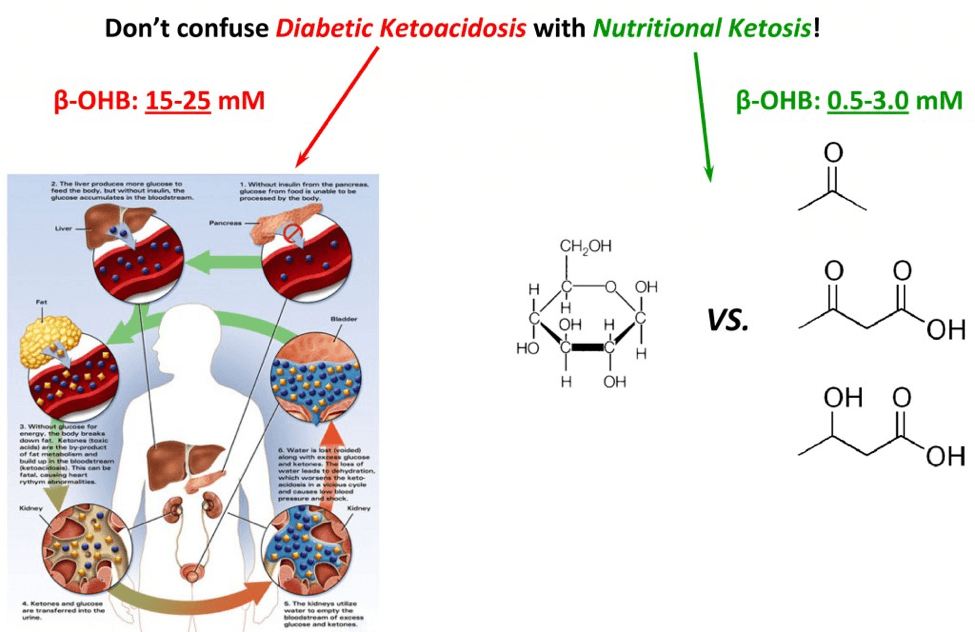You may have heard from your doctor that ketosis is a life-threatening condition. If so, your doctor is confusing diabetic ketoacidosis (DKA) with nutritional ketosis, or keto-adaptation.
First, some semantics. Our body can produce, from fat and some amino acids, three ketone bodies (a “ketone” refers to the chemical structure where oxygen is double-bonded to carbon sandwiched between at least 2 other carbons). These ketone bodies we produce are: acetone, acetoacetone, and beta-hydroxybutyrate (B-OHB). [For anyone who is interested, they are the 3 most right structures on the figure, below.]
Why do we make ketones? For starters, it’s a vital evolutionary advantage. Our brain can only function with glucose and ketones. Since we can’t store more than about 24 hours’ worth of glucose, we would all die of hypoglycemia if ever forced to fast for more than a day. Fortunately, our liver can take fat and select amino acids (the building blocks of proteins) and turn them into ketones, first and foremost to feed our brains. Hence, our body’s ability to produce ketones is required for basic survival.
What is diabetic ketoacidosis? When diabetics (usually Type I diabetics, but sometimes this occurs in very late-stage, insulin-dependent, Type II diabetics) fail to receive enough insulin, they go into an effective state of starvation. While they may have all the glucose in the world in their bloodstream, without insulin, they can’t get any into their cells. Hence, they are effectively going into starvation. The body does what it would do in anyone – it starts to make ketones out of fat and proteins. Here’s the problem: the diabetic patient in this case can’t produce any insulin, so there is no feedback loop and they continue to produce more and more ketones without stopping. By the time ketone levels (specifically, beta-hydroxybutyrate) approach 15 to 25 mM, the resulting pH imbalance leads to profound metabolic derangement and the patient is critically ill.
But this state of metabolic derangement is not actually possible in a person who can produce insulin, even in small amounts. The reason is that a feedback loop prevents the ketone level from getting high enough to cause the change in pH that leads to the cascade of bad problems. A person who is said to be “keto-adapted,” or in a state of nutritional ketosis, generally has beta-hydroxybutyrate levels between about 0.5 and 3.0 mM. This is far less than the levels required to cause harm through acid-base abnormalities.
Keto-adaption is a state, achieved through significant reduction of carbohydrate intake (typically to less than 50 grams per day) and moderate protein, where the body changes from relying on glycogen as its main source of energy to relying on fat. Specifically, the brain shifts from being primarily dependent on glucose, to being primarily dependent on beta-hydroxybutyrate. This has nothing to do with what a diabetic patient is experiencing in DKA, but does illustrate how poorly informed and quick to react the medical community is. DKA and nutritional ketosis (or keto-adaptation) have as much in common as a house fire and a fireplace.
Photo by Andrew Yardley on Unsplash








Hi… I am from India. After getting inspired by a Keto Diet, I was following it for almost a month. I even lost 3 kilos in the initial 8 days, after which the weight loss became quite stagnant. However, I was still continuing with the diet until lately, when my Doctor friend mentioned that Keto is very harmful for the body as certain unhealthy toxins form inside the body and it is not at all healthy to follow in a long run. I am 29 years, 5’1″ in height and weight 72 kilos (obese). I want to shed at least 15 kilos of my body weight. Can you please guide me as to what I should do and how I should go forward.
Dr. Thank you for this blog. I found you while listening to Dr. Rhonda Patrick, Tim Ferris etc.. I appreciate the work all of you are doing. I think doing the Ketone diet is great. I wonder about the long term implications. If we want long term test results we just have to look at the 7th Day Adventists (especially the vegans), Okinawans, etc.. I realize you want to go beyond that.
My biggest issue with this way of eating is it (accidently) gives people license eating Bad fats like bacon and other nitrate filled meats along in frying in any oil since all oils can go rancid before we realize it. If we are not going to put the diet in the context of eating healthy foods than we fool ourselves. Its seems like everyone is so focused on what they are doing they are forgetting the picture picture.
.
I have a question for you and hopefully you can pass this question along to your peers. I can’t get anyone to respond. What is the difference between synthetic vitamins and natural whole food vitamins? For xxample the Garden of life My Kind Organic Whole Food Multi Vitamins look great. But Dr. Rhonda likes her synthetic Multi’s from Vita Cost. This seems crazy to me unless My kind are not what they claim to be? Seems to me there is a huge issue where that few people except Dr. Wallach (Youngevity) speak about but even his products are synthetic.
I realize my question to you might not be your department, but I can’t seem to get the Attention of Dr. Ames or Patrick with my concerns and questions. I am sure this question is also important for you to know the answer.
Its does not make rational sense to put synthetic vitamins into our bodies especially when there mind be a healthy and natural alternative? Thanks I hope you get what I am saying and asking. Take care and good luck.,
Dr Attia, is it healthy to stay on a Ketonic diet over time, even when you already lost weight?
And what about red wine? Alcohol produces glucose in your body or good red wine is healthy and adaptable in a Ketonic diet, in moderate amounts?
Thank’s in advance
I am 5’4″ got up to 170 pounds! I was addicted to food. I did a two day fast and I’ve been now eating a high protein diet. It’s been 1 1/2 weeks and I’ve lost 10 pounds so far. I’ve never felt better. I’ve lost 10 pounds before on veg diet but I allowed myself some carbs. I would still have cravings and be hungry. With high protein I have no cravings. No carb or sugar cravings. I drink 1 cup of almond milk in morning and add my Ancient Nutritions bone broth powder in it. I also add a banana and blend. I do this for breakfast and lunch. I have meat dinner because if I do usually get hungry it’s usually later. I also take a multivitamin daily as well as two prunes a day to um…”help out.”
Hi Peter I’ve been doing KD as a t-1 diabetic in medically diagnosed honeymoon for a good while is it possible to achieve Ketosis by alkalising the body? Well that is my Question that I have. I know that I have a very tight control my blood glucose levels this way. Thanks for the information on your blog
I’m at 3.3 mmol after nearly 2 days of fasting, and one day (before the fast) having switched over to the keto diet.
Peter, you talk about 1-3 being the range, and I understand the danger is for diabetics; however do the benefits of the diet curb off after you exceed 3?
Does this mean I can appropriately add carbs so long as I’m in that range (I’m a natural runner/endurance athlete, and have an incredibly fast metabolism)?
I don’t want to have to do all this monitoring of blood chemistry levels to make sure I’m not harming myself or have to go to the hospital because something went wrong and is having an ill effect on me. I think that just eating a healthy diet of all real foods in moderation with an emphasis on fruits & vegetables is key to good health. Our parents, grandparents & great grandparents didn’t do all this to stay healthy. They ate a well balanced diet with all all types of food but in moderation with an emphasis on fruits & vegetables. The things that have changed is the way our food is produced. There is so many chemicals in our food today, both fresh & processed (synthetic pesticides, herbicides, fertilizers, as well as emulsifiers, flavor enhancers, artificial color enhancers, etc.). These are the things that are making us sick & fat. Just eat organic food to avoid the above things. The meat can be either organic or human certified. Human certified meats & meat products (eggs, milk etc.) often times have higher standards then organic.
Has there ever been any testing of food combinations (potatoes, string beans & a pork chop) eaten in the same meal for glycemic indexes?
Since we don’t usually eat foods in isolation but in combination with other food Ex. pasta with tomato or alfredo sauce, potatoes with butter or sour cream, hot cereal (oatmeal, cream of wheat, grits etc.) with milk, butter & sugar etc. When we eat a meal of say potatoes, string beans & a pork chop it all gets mixed up in our stomach and digested together not in isolation.
Also the reason I ask this is because I make all my own food from scratch and any web page that gives the glycemic index for food has the glycemic index for foods in isolation (flour, butter, string beans, peach etc.) and/or for the highly processed version (ex. blueberry muffin), When I make say a blueberry muffins I use half or less of the sugar called for in the recipe. I also use whole wheat flour not all purpose. I would really like to be able to know what the glycemic index is for the recipes I use for the particular food/s I’m making.
I am close to 60 yrs. old and recently had my annual physical and all my blood work came back within normal range. The majority of the food I’ve eaten all my life has been made from scratch not highly processed stuff that resembles real food but actual real food, just like my parents, grandparents & great grandparents. They all stayed healthy until they were very old. The key here is to eat real food made from scratch not highly processed stuff that resembles real food.
Hello Peter,
You made this statement –
“… Since we can’t store more than about 24 hours worth of glucose, we would all die of hypoglycemia if ever forced to fast for more than 24 hours…”
This is not true. If you don’t eat for 24 hours, you will NOT die! There are many documented cases of people fasting for MUCH longer than 24 hours and still being alive. I love your website and most of the information on this page is accurate, but this statement is simply wrong. I think you should remove this line from this great article.
I think you need to read a bit more carefully, Sara… do you actually think I’m implying that we can’t go more than 24 hours without food?
😂
Hi Peter
My husband started the keto diet to lose weight. After trying many different diets, this one finally worked and he lost about 40 lbs. He has been on it for a few years now and is very committed. I started researching the diet to make sure it is safe and healthy long term. After what I’ve read, I have just one question: how does such a diet effect the kidneys? If someone only has about 120% kidney function rather than a full 200%, will ketosis put too much of a strain on the kidneys?
Great article. I agree that the ketogenic has many benefits but at the same time if we limit carbs to less than 50g/day we might end up with a very low fibre diet. I think the great problem is that ketogenic diets can be extremely variable e.g. massive variations in the content of fatty acids and even fibre they may have.
I worry is that some individuals may follow ketogenic diets extremely low in fiber and this may increase their risk of colorectal cancer in the long-term. Furthermore, if these diets are very high in saturated fatty acids they could have a negative action on lipid profile. What do you think about this?
I have been on the keto diet with an occasional (one day every month or so) carb glut for a day or two. My colon works better than in all my life. Because my husband is on the MAD diet for seizure control. I mostly adhere to the same 20grams of carb a day that he must. Your correct, I get little fiber, yet gone, is the lifetime of constipation and gas and gastric reflux and occasional episodes of nausea and vomiting. Flatulence is a thing of the past. I have been assured by a surgeon that many
older folk do better with less fiber. We do eat a bit of kale, radishes, celery, lettuce, super greens, avocado ang a few others, cacao, flax, almond meal. A few walnuts and pecans.
I am a 59 year old and have been diagnosed with Non Alcoholic Fatty Liver Disease. Will a ketogenic diet stress my liver, with the increased fat intake?
Hi Dr. Attia, I found you through the Tim Ferris podcast and have found your blog wonderfully informative.
My question is whether you are aware of causes for dangerously large spikes in triglyceride and LDL-p values while following a strict ketogenic diet high in saturated fats. Are you aware of any specific genes or conditions that could contribute to such a reaction? I’m having trouble finding any information on related cases.
I never stop being surprised at the medically trained people who can’t distinguish between ketoacidosis and dietary ketosis. Just a week ago I spoke to a retired college professor of nursing who instantly assumed I meant the former when I began relating my experiences with the latter.
Hi Dr. Attia, After diagnosis with and treatment to rid myself of a severe Duodenum Ulcer I was the discovered that I have a Hiatus Hernia. My doctor prescribed tablets called Nexium which serve to reduce the amount of stomach acids thus reducing the reflux and pain. I find I need to take one tablet approximately every 3 to 4 days.
If Ketosis produces acid that eats fat rather than Glucose would this acid be detrimental to my condition?
I’ve been using this ketogenic diet, specifically the Cambridge diet for 3-4 weeks now and I have lost 11 kilos. My problem is that my triglycerides are very high (600) and my cholesterol too. Is this diet connected to these side effects? Thank you in advance
Hi Dr Attia,
I have been experimenting with the keto diet for a couple month and have lost about twenty pounds. I love the way of eating and how I feel when eating high fat low carb. But I am currently not following the diet due to finding out I am pregnant. I have heard it isn’t safe to be in ketosis when pregnant. I was wondering what your thoughts are on this? Thank you so much!
It’s a pity you don’t have a donate button! I’d definitely donate to this fantastic blog!
I suppose for now i’ll settle for book-marking and adding your RSS feed to
my Google account. I look forward to brand new updates and will talk about this blog
with my Facebook group. Chat soon!